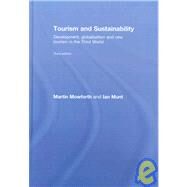- ISBN: 9780415414029 | 0415414024
- Cover: Hardcover
- Copyright: 11/24/2008
"If unequal opportunities are large within many countries they are truly staggering on a global scale", so concludes the World Bank's 2006 World Development Report. It is a global unevenness within which the barriers to in-migration of Third World migrants to wealthy first world nations go ever higher, whilst the barriers to travel in the reverse direction are all but extinct. So how exactly can tourism contribute to narrowing this glaring inequality and gap between the rich and the poor? Are ever expanding tourism markets and the new, responsible, forms of tourism in particular a smoke free, socio-culturally sensitive form of human industrialisation? Is alternative tourism really a credible lever for lifting poverty stricken countries out of the mire of global inequality, setting them on the right track to 'development', and making poverty history? Tourism and Sustainabilitycritically explores and challenges what have emerged as the most significant universal geopolitical norms of the last half century development, globalization and sustainability and through the lens of new forms of tourism demonstrates how we can better understand and get to grips with the rapidly changing new global order. This third edition has been extensively updated and includes new material on: poverty reduction, livelihoods and pro-poor tourism new forms of tourism in cities continuing growth of the fair trade movement tourism's contribution to climate change volunteer and 'gap' tourism affect of disasters on new tourism. Drawing on a range of examples from across the Third World, Tourism and Sustainabilityillustrates the social, economic and environmental conditions for the growth of new tourism. The book is original in its assessment of tourism through the lens of power who holds it; how it is used; and who benefits from the exercise of power in the tourism industry. Additionally, the analysis is an interdisciplinary one and the book will therefore be useful to students of Human Geography, Environmental Sciences and Studies, Politics, Development Studies, Anthropology and Business Studies as well as Tourism itself.






